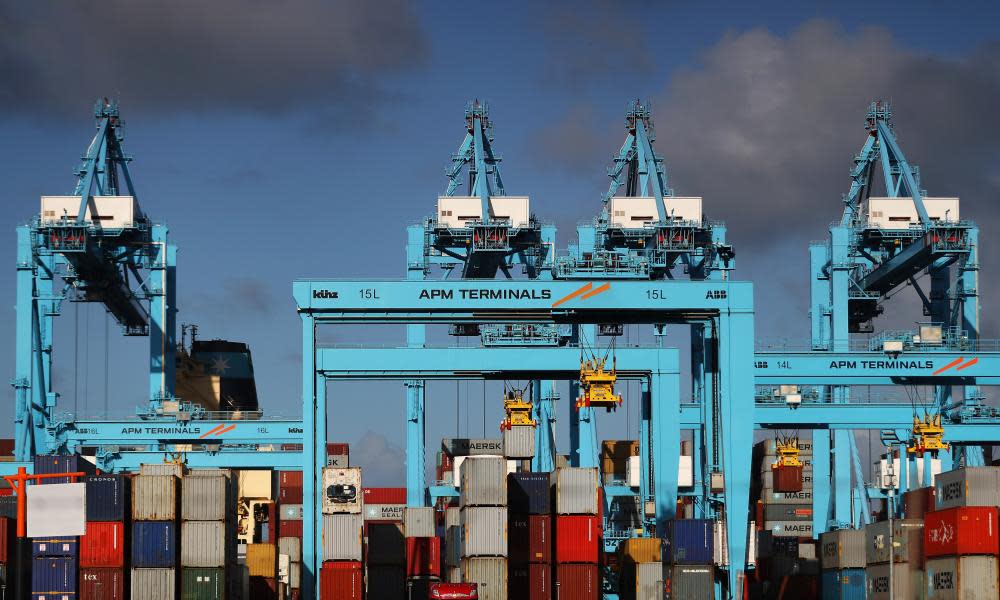Europe must wake up to the drastic consequences of a hard Brexit

Because it is such a riveting clown show with new crazy episodes almost every day, Europeans can be forgiven for ignoring the fact that Brexit is going to hurt them too. But as the date of Britain’s departure comes closer and Theresa May’s government continues its kamikaze policy of demanding the politically unthinkable from the EU, it is time for Europeans to wake and begin preparing for the worst.
On Thursday the Dutch government published a report drawn up by the consultancy firm KPMG analysing the consequences of a “no-deal” Brexit in which the UK leaves the EU without an agreement on 29 March 2019. Here are the practical implications and cold numbers behind the hot-headed rhetoric about no deal with the EU being “better than a bad deal” for Britain: should the UK “crash” out of the EU by late March 2019 the Dutch companies trading with the UK will have to secure a total of no less than 4.2m exporting and 750,000 importing licences. If by this time both states have a functioning customs system in place – a big if for this consistently incompetent UK government – costs for companies are between €80 and €130. That is per licence.
The price tag for all this new red tape is €600m for the Dutch side alone. This excludes the costs of new export and import tariffs, VAT and other new “sector-specific” barriers for trading with the UK. The 35,000 small and medium-sized businesses unused to trading with non-EU countries also face an estimated cost of €20,000-€50,000 to adapt their IT systems.
A hard Brexit could make every Dutch person poorer by an average of €1,000
Added to this, warns the report, must be the likely effects of the inevitable economic slowdown, or worse, in Britain. When the country leaves without a deal it must “fall back” on the minimal World Trade Organisation (WTO) rules for trade. But financial services and aviation fall outside the WTO regime, meaning that after a British no-deal departure both sectors must stop trading with the EU overnight. Between Amsterdam Schiphol airport and London alone there are currently 60 flights a day – one every 15 minutes.
Much like Donald Trump, the Brexiteers have proven themselves immune to information or insight that does not meet their emotional needs. This must be why they continue to hope and insist that in order to avoid this proliferation of new barriers to trade, the EU will relent and allow Britain to have its cake and eat it – to forget about the obligations of EU membership while continuing to enjoy its many advantages.
This simply will not happen. Even the ardently pro-British Dutch government has made clear again that the choice for Britain is simple. It can buckle and accept the EU’s conditions for continued “frictionless trade”, or it becomes a “third country” on the periphery of Europe – like Morocco or Turkey, except that Turkey will have more privileges because of its customs union with the EU.
About 200,000 Dutch jobs are involved in trade with the UK and, according to calculations by the prestigious government agency CPB, a hard Brexit could make every Dutch person poorer by an average of €1,000. And yet, the Dutch government did not use the report to make the case for concessions to Britain. Instead economics minister Mona Keijzer simply said that “it is up to businesses to start preparing”. It also called on government agencies to get ready.
The logic is simple: while the economic shock of a British crash out of the EU will hurt the Dutch economy, blowing up the EU from within by giving Britain a sweet special deal is even more damaging. Because that will encourage each of the 27 remaining member states to seek its own exceptions. Over time this will make the unravelling of the EU single market a near-certainty.
So next time you hear a Brexiteer proudly declare that “no deal is better than a bad deal”, remember that for once this Brexiteer is correct. Not as far as Britain is concerned of course because “no deal” for the UK means the severe disruption of not just one trade flow – as it is for the Netherlands – but of 27. However, for EU member states the negative economic fallout of a British crash departure is far more preferable than the utter catastrophe of the single market imploding. Painful as it will be, no deal with Britain is indeed better for the EU than a bad deal.
• Joris Luyendijk is a Dutch journalist

 Yahoo News
Yahoo News 
